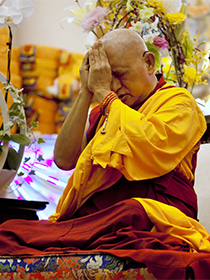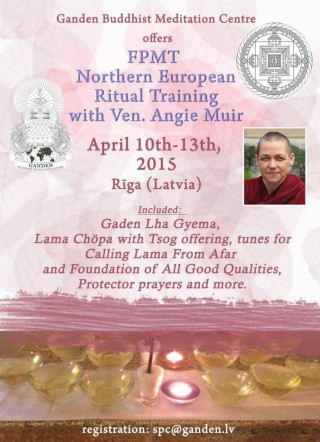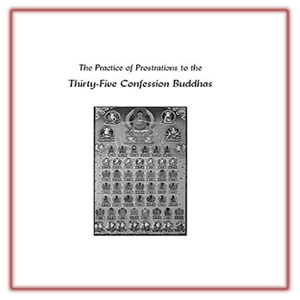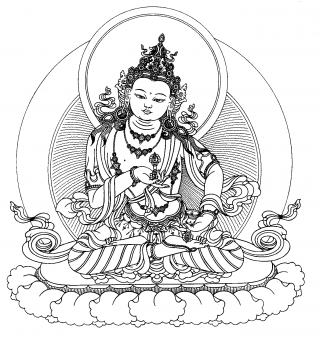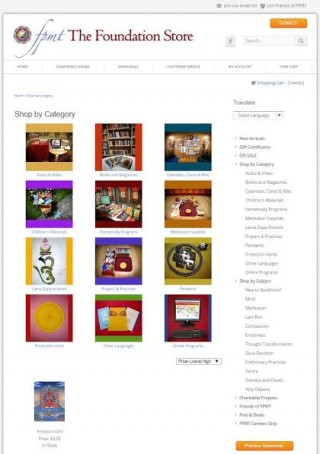- Home
- FPMT Homepage
Foundation for the Preservation of the Mahayana Tradition
The FPMT is an organization devoted to preserving and spreading Mahayana Buddhism worldwide by creating opportunities to listen, reflect, meditate, practice and actualize the unmistaken teachings of the Buddha and based on that experience spreading the Dharma to sentient beings. We provide integrated education through which people’s minds and hearts can be transformed into their highest potential for the benefit of others, inspired by an attitude of universal responsibility and service. We are committed to creating harmonious environments and helping all beings develop their full potential of infinite wisdom and compassion. Our organization is based on the Buddhist tradition of Lama Tsongkhapa of Tibet as taught to us by our founders Lama Thubten Yeshe and Lama Thubten Zopa Rinpoche.
- Willkommen
Die Stiftung zur Erhaltung der Mahayana Tradition (FPMT) ist eine Organisation, die sich weltweit für die Erhaltung und Verbreitung des Mahayana-Buddhismus einsetzt, indem sie Möglichkeiten schafft, den makellosen Lehren des Buddha zuzuhören, über sie zur reflektieren und zu meditieren und auf der Grundlage dieser Erfahrung das Dharma unter den Lebewesen zu verbreiten.
Wir bieten integrierte Schulungswege an, durch denen der Geist und das Herz der Menschen in ihr höchstes Potential verwandelt werden zum Wohl der anderen – inspiriert durch eine Haltung der universellen Verantwortung und dem Wunsch zu dienen. Wir haben uns verpflichtet, harmonische Umgebungen zu schaffen und allen Wesen zu helfen, ihr volles Potenzial unendlicher Weisheit und grenzenlosen Mitgefühls zu verwirklichen.
Unsere Organisation basiert auf der buddhistischen Tradition von Lama Tsongkhapa von Tibet, so wie sie uns von unseren Gründern Lama Thubten Yeshe und Lama Thubten Zopa Rinpoche gelehrt wird.
- Bienvenidos
La Fundación para la preservación de la tradición Mahayana (FPMT) es una organización que se dedica a preservar y difundir el budismo Mahayana en todo el mundo, creando oportunidades para escuchar, reflexionar, meditar, practicar y actualizar las enseñanzas inconfundibles de Buda y en base a esa experiencia difundir el Dharma a los seres.
Proporcionamos una educación integrada a través de la cual las mentes y los corazones de las personas se pueden transformar en su mayor potencial para el beneficio de los demás, inspirados por una actitud de responsabilidad y servicio universales. Estamos comprometidos a crear ambientes armoniosos y ayudar a todos los seres a desarrollar todo su potencial de infinita sabiduría y compasión.
Nuestra organización se basa en la tradición budista de Lama Tsongkhapa del Tíbet como nos lo enseñaron nuestros fundadores Lama Thubten Yeshe y Lama Zopa Rinpoche.
A continuación puede ver una lista de los centros y sus páginas web en su lengua preferida.
- Bienvenue
L’organisation de la FPMT a pour vocation la préservation et la diffusion du bouddhisme du mahayana dans le monde entier. Elle offre l’opportunité d’écouter, de réfléchir, de méditer, de pratiquer et de réaliser les enseignements excellents du Bouddha, pour ensuite transmettre le Dharma à tous les êtres. Nous proposons une formation intégrée grâce à laquelle le cœur et l’esprit de chacun peuvent accomplir leur potentiel le plus élevé pour le bien d’autrui, inspirés par le sens du service et une responsabilité universelle. Nous nous engageons à créer un environnement harmonieux et à aider tous les êtres à épanouir leur potentiel illimité de compassion et de sagesse. Notre organisation s’appuie sur la tradition guéloukpa de Lama Tsongkhapa du Tibet, telle qu’elle a été enseignée par nos fondateurs Lama Thoubtèn Yéshé et Lama Zopa Rinpoché.
Visitez le site de notre Editions Mahayana pour les traductions, conseils et nouvelles du Bureau international en français.
Voici une liste de centres et de leurs sites dans votre langue préférée
- Benvenuto
L’FPMT è un organizzazione il cui scopo è preservare e diffondere il Buddhismo Mahayana nel mondo, creando occasioni di ascolto, riflessione, meditazione e pratica dei perfetti insegnamenti del Buddha, al fine di attualizzare e diffondere il Dharma fra tutti gli esseri senzienti.
Offriamo un’educazione integrata, che può trasformare la mente e i cuori delle persone nel loro massimo potenziale, per il beneficio di tutti gli esseri, ispirati da un’attitudine di responsabilità universale e di servizio.
Il nostro obiettivo è quello di creare contesti armoniosi e aiutare tutti gli esseri a sviluppare in modo completo le proprie potenzialità di infinita saggezza e compassione.
La nostra organizzazione si basa sulla tradizione buddhista di Lama Tsongkhapa del Tibet, così come ci è stata insegnata dai nostri fondatori Lama Thubten Yeshe e Lama Zopa Rinpoche.
Di seguito potete trovare un elenco dei centri e dei loro siti nella lingua da voi prescelta.
- 欢迎 / 歡迎
简体中文
“护持大乘法脉基金会”( 英文简称:FPMT。全名:Foundation for the Preservation of the Mahayana Tradition) 是一个致力于护持和弘扬大乘佛法的国际佛教组织。我们提供听闻,思维,禅修,修行和实证佛陀无误教法的机会,以便让一切众生都能够享受佛法的指引和滋润。
我们全力创造和谐融洽的环境, 为人们提供解行并重的完整佛法教育,以便启发内在的环宇悲心及责任心,并开发内心所蕴藏的巨大潜能 — 无限的智慧与悲心 — 以便利益和服务一切有情。
FPMT的创办人是图腾耶喜喇嘛和喇嘛梭巴仁波切。我们所修习的是由两位上师所教导的,西藏喀巴大师的佛法传承。
繁體中文
護持大乘法脈基金會”( 英文簡稱:FPMT。全名:Found
ation for the Preservation of the Mahayana Tradition ) 是一個致力於護持和弘揚大乘佛法的國際佛教組織。我們提供聽聞, 思維,禪修,修行和實證佛陀無誤教法的機會,以便讓一切眾生都能 夠享受佛法的指引和滋潤。 我們全力創造和諧融洽的環境,
為人們提供解行並重的完整佛法教育,以便啟發內在的環宇悲心及責 任心,並開發內心所蘊藏的巨大潛能 — 無限的智慧與悲心 – – 以便利益和服務一切有情。 FPMT的創辦人是圖騰耶喜喇嘛和喇嘛梭巴仁波切。
我們所修習的是由兩位上師所教導的,西藏喀巴大師的佛法傳承。 察看道场信息:
- FPMT Homepage
- News/Media
-
- Study & Practice
-
-
- About FPMT Education Services
- Latest News
- Programs
- New to Buddhism?
- Buddhist Mind Science: Activating Your Potential
- Heart Advice for Death and Dying
- Discovering Buddhism
- Living in the Path
- Exploring Buddhism
- FPMT Basic Program
- FPMT Masters Program
- FPMT In-Depth Meditation Training
- Maitripa College
- Lotsawa Rinchen Zangpo Translator Program
- Universal Education for Compassion & Wisdom
- Online Learning Center
-
- Prayers & Practice Materials
- Overview of Prayers & Practices
- Full Catalogue of Prayers & Practice Materials
- Explore Popular Topics
- Benefiting Animals
- Chenrezig Resources
- Death & Dying Resources
- Lama Chopa (Guru Puja)
- Lama Zopa Rinpoche: Compendium of Precious Instructions
- Lama Zopa Rinpoche: Life Practice Advice
- Lama Zopa Rinpoche Practice Series
- Lamrim Resources
- Mantras
- Prayer Book Updates
- Purification Practices
- Sutras
- Thought Transformation (Lojong)
- Audio Materials
- Dharma Dates - Tibetan Calendar
- Translation Services
- Publishing Services
- Ways to Offer Support
- Prayers & Practice Materials
-
- Teachings and Advice
- Find Teachings and Advice
- Lama Zopa Rinpoche Advice Page
- Lama Zopa Rinpoche: Compendium of Precious Instructions
- Lama Zopa Rinpoche Video Teachings
- ༧སྐྱབས་རྗེ་བཟོད་པ་རིན་པོ་ཆེ་མཆོག་ནས་སྩལ་བའི་བཀའ་སློབ་བརྙན་འཕྲིན།
- Podcasts
- Lama Yeshe Wisdom Archive
- Buddhism FAQ
- Dharma for Young People
- Resources on Holy Objects
- Teachings and Advice
-
-
*If a menu item has a submenu clicking once will expand the menu clicking twice will open the page.
-
-
- Centers
-
- Teachers
-
- Projects
-
-
-
-
*If a menu item has a submenu clicking once will expand the menu clicking twice will open the page.
-
-
- FPMT
-
-
-
-
-
Think that everyone you meet is fulfilling all your wishes.
Lama Zopa Rinpoche
-
-
-
- Shop
-
-
-
The Foundation Store is FPMT’s online shop and features a vast selection of Buddhist study and practice materials written or recommended by our lineage gurus. These items include homestudy programs, prayers and practices in PDF or eBook format, materials for children, and other resources to support practitioners.
Items displayed in the shop are made available for Dharma practice and educational purposes, and never for the purpose of profiting from their sale. Please read FPMT Foundation Store Policy Regarding Dharma Items for more information.
-
-
Study & Practice News
11
Rituals Service Seminar Offered in Latvia this April
Ganden Buddhist Meditation Centre, FPMT’s Latvian center, will be hosting a Rituals Service Seminar with Ven. Angie Muir from April 10 – April 13, 2015.
This four-day Rituals Service Seminar provides in-depth instruction on Lama Zopa Rinpoche’s method of leading the pujas and practices that he most often recommends for FPMT centers and students. Encompassing Essential Buddhist Prayers, Vol. 2 and Lama Chöpa, students learn how to set up the altar, lead motivations and meditations according to Rinpoche’s style, and the specific tunes used by Rinpoche for these pujas.
Ven. Angie Muir is also currently updating FPMT Education’s Rituals Training Manual with a team of other FPMT Registered Teachers to help support the success of more of these trainings throughout the world.
Registration in advance for foreign students is encouraged as the center cannot provide, but will be able to help students locate, accommodation.
€40 is the suggested cost to students for this entire training, but if the student is unable to offer this, they should contact the Spiritual Program Coordinator directly to work out a solution.
For more information including a complete schedule, please contact Agnese Bišofa by phone ( +371 275 51900) or by email (spc@ganden.lv).
Through comprehensive study programs, practice materials, training seminars, and scholarships, FPMT Education nourishes the development of compassion, wisdom, kindness, and true happiness in individuals of all ages.
- Tagged: latvia, rituals, service seminar
- 0
4
Tips for Memorization
Memorization becomes increasingly important to Buddhist practice and study as one learns, and commits to memory, many prayers, practices, mantras, sutras, lineage details and much more.
Recently, Mandala magazine published an online article about memorization by Ven. Tenzin Gache (Brian Roiter), an American monk and top memorizer and debater, who just finished his seventh year of study in Sera Je’s geshe program.
Here we include Ven. Gache’s memorization tips with the hopes that students can benefit from this valuable advice.
Tips for Memorization:
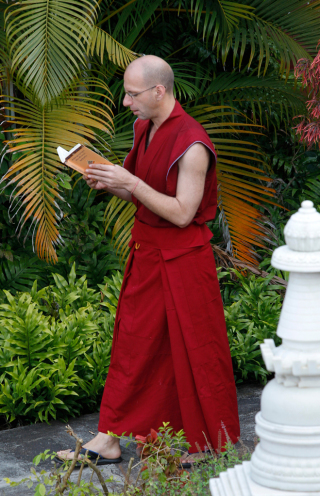
Ven. Tenzin Legtsok memorizing at Sera IMI House, India, November 2013. Photo by Sandesh Kadur|www.felis.in.
- Set aside some time each day, preferably early in the morning for new material and late in the evening for re-reciting what you memorized in the morning.
- Sit up straight or gently pace in an open area, preferably somewhere where your recitation won’t disturb others.
- Before memorizing, “warm-up” with recitations like Praise of Manjushri, Prayer to Achieve Inner Kalarupa, and Chanting the Names of Manjushri.
- Start by reciting one half a line. When you can recite this five times without looking at the book, recite the second half. Then recite them together. Then do another line. Then add the two together. Continue in this way, gradually adding to the total, until you finish a verse or a few lines of prose. If you are able, start again with a second verse. Then recite the two together. Over time, you may be able to increase the number of verses you can do in a day
- Once you have something committed to memory, continue to recite it once or more a day until it becomes stable. Then gradually decrease your recitation to once every two days, three days, etc. If you have something very well memorized, you may only need to recite it once a month, but getting to that point will take time.
- During your daily activities, minimize distraction and stimulation, especially loud music. Just as when meditating, keeping your mind clear will enhance your practice sessions.
Some Additional Suggestions (optional):
- Before beginning to memorize something, simply recite it every day for one month.
- When you have memorized something well, stop reciting it for some time. When you start again, it will take a little time to bring it back, but it will become more stable.
- Ask a friend or teacher to examine you on what you have memorized – preparing for an exam can enhance your focus.
Through comprehensive study programs, practice materials, training seminars, and scholarships, FPMT Education nourishes the development of compassion, wisdom, kindness, and true happiness in individuals of all ages
- Tagged: memorization
- 0
25
Lama Zopa Rinpoche’s Mantra Recitations Volume Two Now Available
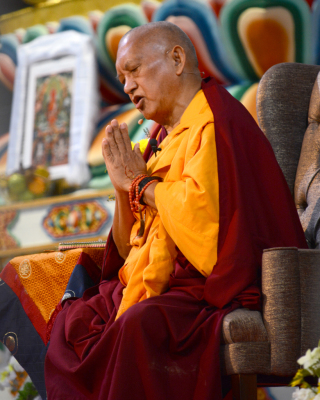
Lama Zopa Rinpoche, Great Stupa of Universal Compassion, AUS, September 2014. Photo by Kunchok Gyaltsen.
In this new collection of studio recordings, Lama Zopa Rinpoche chants several prayers and mantras at different speeds, allowing students to become familiar with Rinpoche’s pronunciation and also Rinpoche’s preferred tunes.
- Chenrezig, homage and the longest mantra
- Heart Sutra Mantra
- Homage and Praise to Shakyamuni
- Invoking the Buddhas
- Namgyälma Mantra, short
- Namo Gurubhya, LC3
- Offering Cloud Mantra
- Offering Prayer
- Praise to the Mother Prajnaparamita
- The Power of Truth, short
- Tagged: fpmt education services, mantras
- 0
18
French Translation Services Successful Training
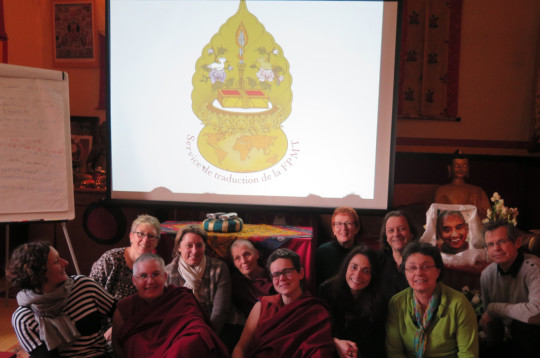
FPMT French Translation Services translators participated in a successful two-day training this February.
Thirteen members of the FPMT French Translation Services team met for a two-day training from February 14-15, 2015. The meeting was a mix of old and new translators and offered a rare opportunity for translators to meet each other in real life, share difficulties and experiences, learn some translation methodology, and brainstorm on topics such as:
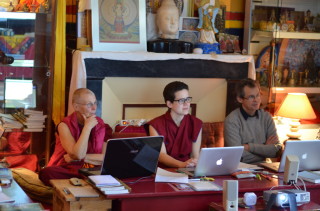
Translators benefited from the experiences and insight of one another.
- What qualities should a Dharma translator possess?
- What is a good translation?
According to Ven. Lobsang Détchèn, French Translation Services Coordinator, “It was a very harmonious, inspiring and humbling meeting. It was especially inspiring to see the wealth of experience, knowledge, wisdom, dedication and sense of humor that was collectively gathered. Each one of us left the training with an uplifted mind and renewed energy to translate the Dharma.”
You can learn more about FPMT’s French Translation Services:
Through comprehensive study programs, practice materials, training seminars, and scholarships, FPMT Education nourishes the development of compassion, wisdom, kindness, and true happiness in individuals of all ages.
- Tagged: french translations, translation services
- 0
11
Mantra Recitations from Lama Zopa Rinpoche
In this free collection of studio recordings, Lama Zopa Rinpoche chants several deities’ mantras at different speeds, allowing students to become familiar with Rinpoche’s pronunciation and also Rinpoche’s preferred tunes.
This collection of MP3 recordings include:
- Green Tara mantra
- Maitreya mantras
- Chenrezig’s MANI mantra fast and slow
- Manjushri mantra with and without the mala recitation of DHIs at the end
- Medicine Buddha long and short mantras
- Shakyamuni Buddha mantra fast and slow
Total length of collection: 12 minutes 45 seconds.
Volume 2 of Lama Zopa Rinpoche’s Mantra Recitations is currently underway so please stay tuned for an announcement of this next installment in the series.
Through comprehensive study programs, practice materials, training seminars, and scholarships, FPMT Education nourishes the development of compassion, wisdom, kindness, and true happiness in individuals of all ages.
- Tagged: foundation store, fpmt education
- 0
29
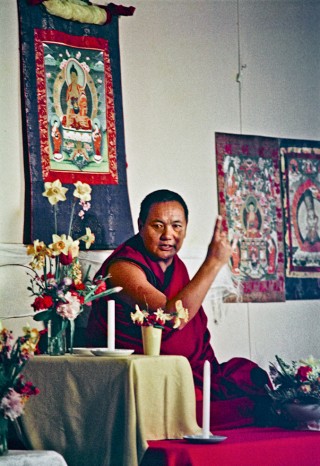
Lama Yeshe teaching at Olinda, Australia. On July, 26 1976, Lama Yeshe gave a public lecture in Melbourne. That same evening a weekend course for eighty commenced at Olinda in the Dandenong Ranges outside the city. Photo courtesy of Lama Yeshe Wisdom Archive (lamayeshe.com).
What if your dear mother were caught in a blazing fire? You would not relax and say, “Let her burn. I don’t have time to get her out right now. I’ll do it later.” Of course you would stop whatever you were doing, no matter how seemingly important, and immediately rush to rescue her. We must regard all beings as our mother – and they are indeed trapped and burning in the fire of wrong conceptions and negativities. We must not be lazy about this! We must transform every action – eating, sleeping, working – into Dharma wisdom.
But we are lazy, aren’t we? Our impure mind lets us live life as if it were a tea party: “Let my mother burn – I’ll pull her out of the fire when I’ve finished enjoying myself.” Of course, we do not say these words, but our inner feeling, beyond words, reflects this attitude. Be careful; we often behave like this.
All the same, we don’t need to get too emotional about all this. If I pump you up too much, you’ll get overexcited and not want to do anything but run off to the mountains to meditate or run off preaching that everybody should practice Buddhism just like you do. That becomes another problem.
– Lama Yeshe, from When the Chocolate Runs Out, published by Wisdom Publications
Lama Yeshe was the founder of the Foundation for the Preservation of Mahayana Tradition (FPMT), a Tibetan Buddhist organization dedicated to the transmission of the Mahayana Buddhist tradition and values worldwide through teaching, meditation and community service.
- Tagged: lama yeshe, when the chocolate runs out
- 0
28
Practices to Benefit Pretas, Nagas and Spirits
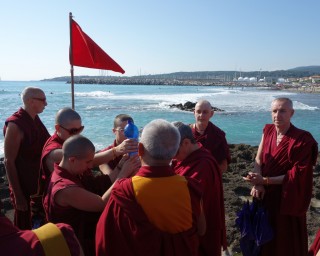
Lama Zopa Rinpoche with Sangha at the beach doing offerings to pretas, Italy, June 2014. Photo by Ven. Roger Kunsang.
The practices of offering charity to spirits, pretas and nagas are often recommended by Lama Zopa Rinpoche – both for the benefit of the practitioner and for the benefit of the beings to which the practices are dedicated. This new PDF compilation, Practices to Benefit Pretas, Nagas and Spirits, includes advice and commentary from Lama Zopa Rinpoche as well as translation and commentary from Julia Graves.
An excerpt from Lama Zopa Rinpoche’s commentary:
“The Tibetan word “sur” (Tib. gsur) refers to the smell of roasted flour that is offered to spirits. The best times for practicing sur are in the evening or at night. You do this practice during a break from sitting meditation – not a break time from Dharma practice but a break time from sitting meditation. The text says “night time;” I think that evening or night time are best because these are the times when spirits wander. This is also the time when dakinis gather. It’s easier for the intermediate state beings to get what you offer at those times. If you cannot do it at those times, then other times are acceptable, but those are best.”
Through comprehensive study programs, practice materials, training seminars, and scholarships, FPMT Education nourishes the development of compassion, wisdom, kindness, and true happiness in individuals of all ages.
14
Prostrations to the 35 Confession Buddhas Now Available
Prostrations to the Thirty-Five Confession Buddhas is one of the most powerful methods available to purify harmful actions we have done in the past. By doing this practice mindfully, we can prevent unwanted sufferings from occurring in the future. In addition, this practice clears away obstacles to our practice and opens the mind to gain realizations on the path. It is said that if you do this practice first thing in the morning, all your other prayers and activities of the day will be empowered.
Through comprehensive study programs, practice materials, training seminars, and scholarships, FPMT Education nourishes the development of compassion, wisdom, kindness, and true happiness in individuals of all ages.
- Tagged: 35 confession buddhas, prostrations
- 0
31
Purification for the New Year
As Lama Zopa Rinpoche advises, “If you want others to love you, you must first love others. If you benefit others, naturally they will benefit you. The cause and effect of karma is as simple as this. The Vajrasattva purification practice, which is more powerful than negative karma, can prevent you from experiencing the problems that negative karma would otherwise bring you. Thus, the practice of purification is one of the most important solutions to our problems and is extremely necessary, even for people who believe that we have only one life.”
For many of us, the new year signifies a time for reflecting on our past year and making aspirations to improve the actions of our body, speech and mind for the benefit of ourselves and others.
You can find a short Vajrasattva sadhana complete with a purification practice including the four opponent powers through the FPMT Foundation Store.
Additionally, the Lama Yeshe Wisdom Archive has collected and made available extensive advice on purification practices.
24
Prayers Practices Resources and Supplies to Enrich Your Practice
FPMT Education Services has made many resources available to you online. You can keep up with updates about newly released practices and materials, learn more about FPMT study programs, download free practices, find information and resources relating to mantras and sutras, utilize death and dying resources, access teachings and advice, read information about FPMT Service Seminars and many more links to valuable information and resources.
The FPMT Foundation Store is a gateway to all of your study and practice needs. You can find study programs, essential prayers, practice booklets, meditation supplies, ritual items, mantra and deity cards and more. Earlier this year FPMT Education Services announced that many of our practices are now available as free download from the Foundation Store.
Please take time to see all that is available to you. We are always happy to help you find what you need or answer any questions.
Through comprehensive study programs, practice materials, training seminars, and scholarships, FPMT Education nourishes the development of compassion, wisdom, kindness, and true happiness in individuals of all ages.
- Tagged: foundation store, fpmt education
- 0
20
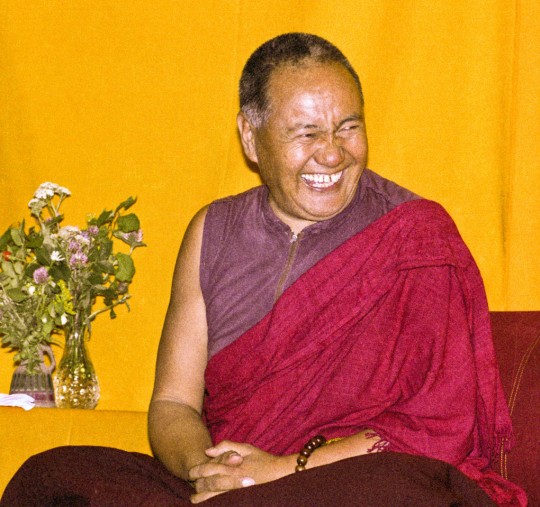
Over one weekend at Barnens O on Vaddo in September of 1983, Lama Yeshe gave a meditation course which later was published in English called “Light of Dharma,” translated into Swedish as “Lamas ljus.” Photo by Holger Hjorth, from Lama Yeshe Wisdom Archive (lamayeshe.com).
If someone’s giving you a hard time and your ego starts to hurt, instead of reacting, just take a look at what’s going on. Think of how sound is simply coming out of the other person’s mouth, entering your ear, and causing pain in your heart. If you think about this in the right way, it will make you laugh; you will see how ridiculous it is to get upset by something so insubstantial.
– Lama Yeshe, from When the Chocolate Runs Out, published by Wisdom Publications
Lama Yeshe was the founder of the Foundation for the Preservation of Mahayana Tradition (FPMT), a Tibetan Buddhist organization dedicated to the transmission of the Mahayana Buddhist tradition and values worldwide through teaching, meditation and community service.
- Tagged: lama yeshe, when the chocolate runs out
- 0
8
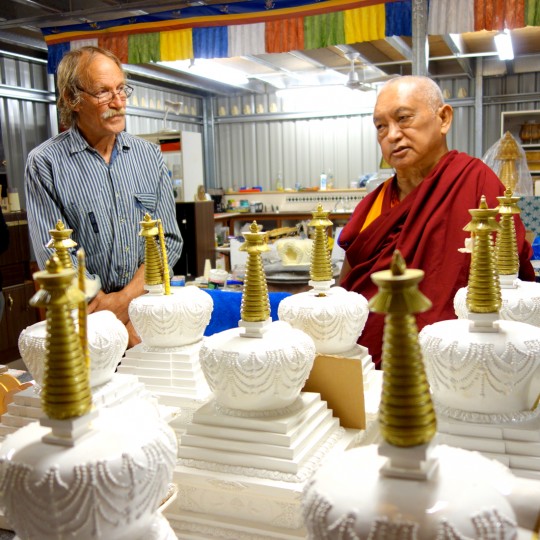
Lama Zopa Rinpche with Garrey Foulkes in the recently completed art studio at Chenrezig Institute, Eudlo, Queensland, Australia, September 2014. Photo by Ven. Roger Kunsang.
“… Every time you look at holy objects – pictures of the Buddha, statues, scriptures, stupas – they plant the seed of liberation and enlightenment in your mental continuum. So every time you look at them they purify your mind. They plant the seed of enlightenment, which includes all the causes to achieve enlightenment,” Lama Zopa Rinpoche instructs in “Why Holy Objects Are Precious and Wish-fulfilling.”
“How? When you look at them they plant a seed or positive imprint on your mental continuum so that later when you meet Buddhadharma, either in this life or in future lives, you are able to understand the words and the meaning of the teachings. From that, you are able to practice the meaning of the Dharma you have understood, which causes you to cease the gross and subtle defilements by actualizing the path and then your mental continuum becomes omniscient mind. This is what is meant when we say that by seeing holy objects it plants the seed of enlightenment on the mind – it contains the whole path from guru devotion and the three principals up to the two stages of tantra and enlightenment. Seeing holy objects makes us actualize all of this as a result. This is the effect we get from seeing them and this is how they cause us to achieve enlightenment. …”
You can read the complete advice “Why Holy Objects Are Precious and Wish-fulfilling” as a PDF found with other advice from Rinpoche on holy objects on FPMT.org.
Learn more about Lama Zopa Rinpoche, spiritual director of the Foundation for the Preservation of Mahayana Tradition (FPMT), and Rinpoche’s vision for a better world. Sign up to receive news and updates.
- Tagged: advice, holy objects, lama zopa rinpoche
- 0
- Home
- News/Media
- Study & Practice
- About FPMT Education Services
- Latest News
- Programs
- New to Buddhism?
- Buddhist Mind Science: Activating Your Potential
- Heart Advice for Death and Dying
- Discovering Buddhism
- Living in the Path
- Exploring Buddhism
- FPMT Basic Program
- FPMT Masters Program
- FPMT In-Depth Meditation Training
- Maitripa College
- Lotsawa Rinchen Zangpo Translator Program
- Universal Education for Compassion & Wisdom
- Online Learning Center
- Prayers & Practice Materials
- Overview of Prayers & Practices
- Full Catalogue of Prayers & Practice Materials
- Explore Popular Topics
- Benefiting Animals
- Chenrezig Resources
- Death & Dying Resources
- Lama Chopa (Guru Puja)
- Lama Zopa Rinpoche: Compendium of Precious Instructions
- Lama Zopa Rinpoche: Life Practice Advice
- Lama Zopa Rinpoche Practice Series
- Lamrim Resources
- Mantras
- Prayer Book Updates
- Purification Practices
- Sutras
- Thought Transformation (Lojong)
- Audio Materials
- Dharma Dates – Tibetan Calendar
- Translation Services
- Publishing Services
- Teachings and Advice
- Find Teachings and Advice
- Lama Zopa Rinpoche Advice Page
- Lama Zopa Rinpoche: Compendium of Precious Instructions
- Lama Zopa Rinpoche Video Teachings
- ༧སྐྱབས་རྗེ་བཟོད་པ་རིན་པོ་ཆེ་མཆོག་ནས་སྩལ་བའི་བཀའ་སློབ་བརྙན་འཕྲིན།
- Podcasts
- Lama Yeshe Wisdom Archive
- Buddhism FAQ
- Dharma for Young People
- Resources on Holy Objects
- Ways to Offer Support
- Centers
- Affiliates Area
- Teachers
- Projects
- Charitable Projects
- Make a Donation
- Applying for Grants
- News about Projects
- Other Projects within FPMT
- Support International Office
- Projects Photo Galleries
- Give Where Most Needed
- FPMT
- Shop
Translate*
*powered by Google TranslateTranslation of pages on fpmt.org is performed by Google Translate, a third party service which FPMT has no control over. The service provides automated computer translations that are only an approximation of the websites' original content. The translations should not be considered exact and only used as a rough guide.One of the hallmarks of Buddhism is that you can’t say that everybody should do this, everybody should be like that; it depends on the individual.







